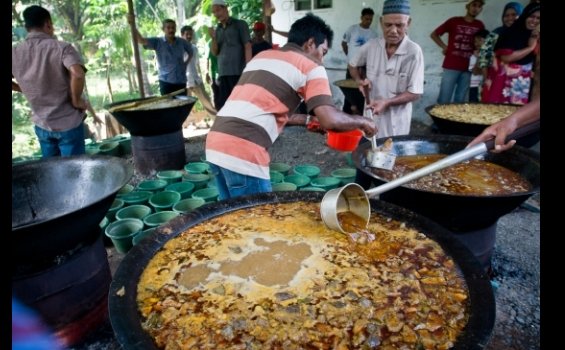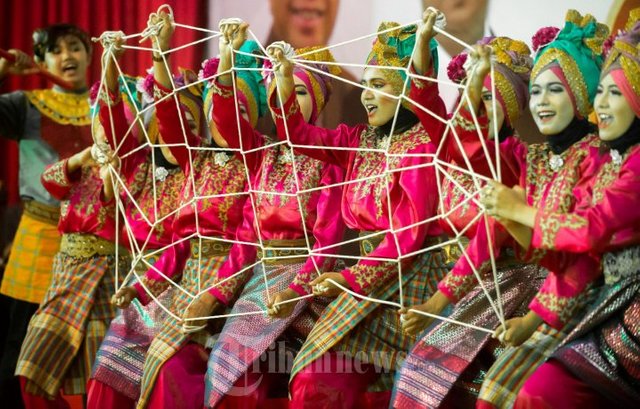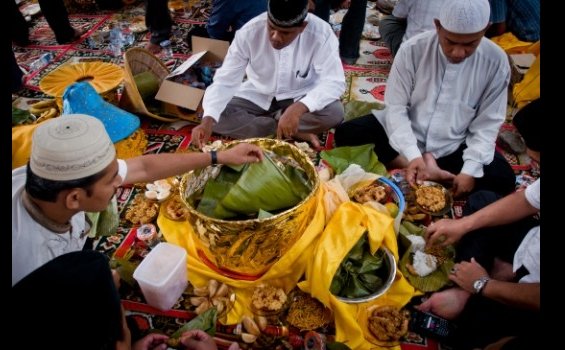Aceh, Culture and Islam in The custom of The Birth Day Celebration of The Prophet
Religion and Cultural Acculturation
Religion, including Islam, contains symbols of a socio-cultural system that provides a conception of reality and design to make it happen. But the symbols concerning this reality do not necessarily have to be the same as the realities embodied in the life of society. Any religious teaching, human conception of reality is not based on knowledge, but a belief in an absolute authority different from one religion to another. In Islam, the conception of reality comes from the revelation of the Qur'an and the Hadith. The basic conception of reality of these two sources is considered absolute and therefore, transcendent from social reality. But religion is also a social reality, it lives and manifests in society. Here the doctrine of religion which is a conception of reality must deal with the reality of existence, and even necessity or sunnatullah in the form of social change. Thus the Qur'an is believed by Muslims as the final truth that can not be changed and applies to all times and places clashing with the ever-changing social reality. The question that arises, if Islam (Al-Qur'an) which not to be changed is a conception of reality is Islam be a supporter or otherwise an obstacle to cultural development? In a more popular form, is Islam a barrier to social change leading to the welfare of humanity?
Throughout history since the early days has created a tension between the theological doctrine of Islam with social reality and development. However, in practical applications, Islam is "forced" to accommodate socio-cultural realities. When the main doctrines of the Qur'an concerning Jurisprudence, for example, are formulated in detail, then the jurists are also forced to consider socio-cultural factors. Hence, among other things, differences are made-however small, for example among the madhhab priests. Imam as-Syafi'i for example, developed what is called qaul qadim when he was in Iraq and qaul jadid when moving to Egypt.
So since the beginning of its development Islam as a conception of reality has received socio-cultural accommodation. This accommodation is increasingly visible when the Islamic region develops in such a way that it becomes a worldwide religion. In certain cases, the accommodation is created in such a way that it creates various "variants of Islam". For example, some people prefer to refer to Islam in Java as "Javanese religion" or Arabs refer to Shi'ism in Iran as "Persian religion" rather than Islam itself.
The concept of integration or accommodation is increasingly evident when associated with the view that Islam should not seen in the context of revelatory and doctrinal religion alone. But Islam must be seen also as a cultural and social phenomenon and phenomenon.
In this context that Islam is dodging with culture and history, giving rise to a new and patterned Islamic mosaic of Islam in this culture in which the religion grew and developed, the Middle East, Africa, Europe, Asia including Indonesia and Aceh. If you follow the thought line of accommodation, it will bring up at least two variants of Islam called by using various terms. Islam as a cultural conception is called great tradition, while Islam as a cultural reality is called little tradition or local tradition.
Great tradition essentially represents Islam as a conception of reality and little tradition or local tradition. With other words, "Islam" and "Islami cate" areas of "Islamic", which are influenced by Islam.In a narrower scope, this doctrine is embedded in the conceptions of faith and sharia that govern the thinking and action of every Muslim. This great tradition is often called the central tradition contrasted with the periphery. On the other hand, the small tradition (local tradition, Islamicate) is the realm of influence - the areas under the influence of Islam or the great tradition.
Integration of Hukom Ngon Adat
The Acehnese philosophy of life is the integration between the hukom ngon adat (religion and custom) contained in hadih majah (adage) "Hukom ngon Adat lagee ngon sipheut substance" (hokum or religion and custom as substance and nature, inseparable). Hadih maja the other; "Hukom meunyo hana custom tabeue, custom meunyo hana hukom bateue" (the law if no custom is bland, custom if without law void). It is understandable that between the culture and teachings of Islam have interacted and assimilated harmoniously in Aceh society for hundreds of years.
The concrete form of culture and custom in the life of the Acehnese is not only applied in the social, economic and political fields, but also in the legal field.
Therefore, Islam being a way of life that crystallizes in Acehnese culture and custom seems irrefutable. In the system, institutions and social structure is quite prominent, meaning Islam is used as a world view (view of life). For example, the highest government system of nanggroe (kingdom or state) to the lowest level (gampong or desa). At the level of the empire the sultan first manage with the problems, social, political and administrative, while religion and adat were within the authority of qadhi (ulama) as an adviser to the sultan at that time. The famous Qadhi are Shamsuddin as-Sumatrani (1630 M), Nur al-Din ar-Raniri (1658 M) and Abdurrauf As-Singkili (1693 M). These scholars are the social, political and cultural processes of the Acehnese society. Then at the village level led by the keuchik (village head) who takes care of the government's problems. In addition, there is a meunasah imum that leads all religious affairs. Until now usual office of keuchik and meunasah always adjacent or in one complex, even first meunasah also serve as office keuchik. Understanding and practice of Islamic teachings in Aceh is the concept of integration and accommodation.
Badruzzaman Ismail, Chairman of Aceh Provincial Assembly, said that Aceh's customs are very strong with Islamic colors. Islamic values such as humainism, equality, peace, togetherness are applied in adat, Aceh culture. For example, conflicts that occur reconcile with the traditional approach known as suloh. Suloh comes from Islam which islah, which means peace.
Integration of Hukom ngon Adat (Law and Custom) In Uroe Maulod (The day of Birth Prophet Muhammad SAW)
Formerly in Aceh society at the night of 12 Rabiul Awal, greeted by burning candles or small lights in pairs in front of the house and done kenduri or event eat (slametan) while reading the stories of Prophet Muhammad contained in the book of al-Barzanji. Then the maulod memorial is held for over 100 days afterwards or known as "lhee buleuen siploh uroe" (three months and ten days). The kenduri after the evening of 12 Rabiul awal is ussually held during the day. But currently burning candles and fruits on the night of 12 Rabiul Awal has been not done again.
The Maulod celebration which is held in three months is the month of Rabiul Awal (maulod awai), Rabiul Akhir (maulod teungoh) and in the beginning of Jumadil (maulod akhe). According to Teungku Husnaini Hasbi one of the Imams of Settlements in Lhokseumawe asserted that in addition because the months are considered blessed also backed by the conditions and conditions of the past community that more farmers. The economic situation improves with the arrival of the harvest, the three months above is the usual month of rice harvest. At that time the community has the ability to perform the maulid because of the availability of abundant rice and money to prepare other things.
The Acehnese celebrated the maulod festively at the same time in each gampong (village). The length of time of this maulod is an effort so that all layers of society in order to choose when the time is right to carry out the feast. On the other hand it can also be read as a benefit that will be chosen by the community to prepare well in order to welcome the memorial of the maulod.
On the day of "Uroe Maulod", people sincerely giving charity fast food to be enjoyed together which is centered in meunasah or local mosque. The food that is distributed by the community is rice wrapped in a triangular banana leaf called "bue kulah" along with side dishes ranging from chicken curry, goat curry, fish curry, duck egg, vegetable jackfruit, fruits, cakes and others. The food is wrapped in a hood and on it is usually covered with a golden cloth. The cone hood is conical with the dominant color of green, yellow, and black called "Idang Meulapeh". At the time of "Uroe Maulod", representatives of orphans and the poor received special service from the community as a form of their love for the group. There are even in some areas in Aceh, the community in addition to providing maximum kenduri, also menyantuni them with some money and various other gifts to take home. This tradition is almost equally distributed throughout Aceh, since the moment can be both meaningful at the same time. On the one hand, the event of kenduri maulid, but on the other hand can also be pioneered by orphans and the poor who is also a reflection of the Prophet's suggestion contained in the Qur'an and as-Sunnah. For the people of Aceh, this tradition is done as a momentum to increase people's understanding of Islam, strengthen the faith in Allah swt. and their love for the Messenger of Allah, and strengthening the Islamic ukhuwah to foster social solidarity, strengthening social ties and sensitivity to the fate of others. That is the basic purpose of the tradition, and this goal is relevant to the purpose of Islam. If the celebration of the maulod is held in one meunasah then the other meunasah are invited to eat the dish, so if one gampong is done then another gampong is also invited, as well as the settlement. Invitations are usually about 50-100 people for each gampong, they eat a meal inside or in the meunasah or mosque. The invitation to sit cross-legged and circular, facing a full session of side dishes and bu beginner. This procession is held during the day after Dhuhur prayer, or after Ashar. After they have eaten the meal, each family head will be given a packet containing the side dishes and the bu kulah. Especially in Aceh Besar and Banda Aceh, usually will be given sauce belangon (cow or ox curry) cooked together in meunasah or mosque.

Along with the times, there are changes that occur. Maulod celebration is no longer based on level, because the important thing is that the celebration of the maulod is up to three months. So during that time in every Gampong or settlement, maulod celebrations can be held depending on the desire and readiness of a gampong to organize them. But usually between gampong one with another, not too intermittent because it is still in one settlement.
In the area of Pidie and Banda Aceh on the day the maulod orphans and the poor will be invited to the house for a meal before the celebration is held in the meunasah or mosque. As a reflection that the Prophet Muhammad. very loving to orphans and the poor. They are also specially presented in meunasah sometimes given clothes and money.
While in Nagan Raya, the maulod is celebrated somewhat differently from the other regions as it lasts for at least two days (although it lasts for three months); one day termed uro meuroh (day to invite) and next day termed with uro dzikee (day of dhikr or day of festivity).
In uro meuroh, the owner of the house came to a number of taulan (friend) and relatives houses and invited them to attend a festive dinner at his home the next day. The invited people will do their utmost to fulfill the invitation because the inviter will feel very happy if his invitation is fulfilled. If the person invited was deliberately out of the gampong or traveling on the day of the festivity, it would be regarded as a break in silaturrahmi unless there were urgent matters. In addition, in Nagan Raya there is a feast for Habib (Habib Abdur Rahim bin Habib Abdul Qadir Ramaa'n bin Sayyid Athah al-Qadiri or Habib Muda Seunagan, adherents of the Syattariyah tarekat (another opinion Qadaryah wa Naqsyabandiyah) also termed Maulod Habib This feast is still practiced until now.Maulod Habib held at night and afternoon enjoying the meal of Prophet's Maulod.
Thank You For All




In prayer it is better to have a heart without words than words without a heart.
- Mahatma Gandhi
thanks
@ijoel Amazing job! Followed.
thank friend
@ijoel What a wonderful and heartwarming Tale..
This post recieved an upvote from minnowpond. If you would like to recieve upvotes from minnowpond on all your posts, simply FOLLOW @minnowpond
This post has received a 1.14 % upvote from @booster thanks to: @ijoel.
@ijoel thnx for putting this information all with each other. Followed.